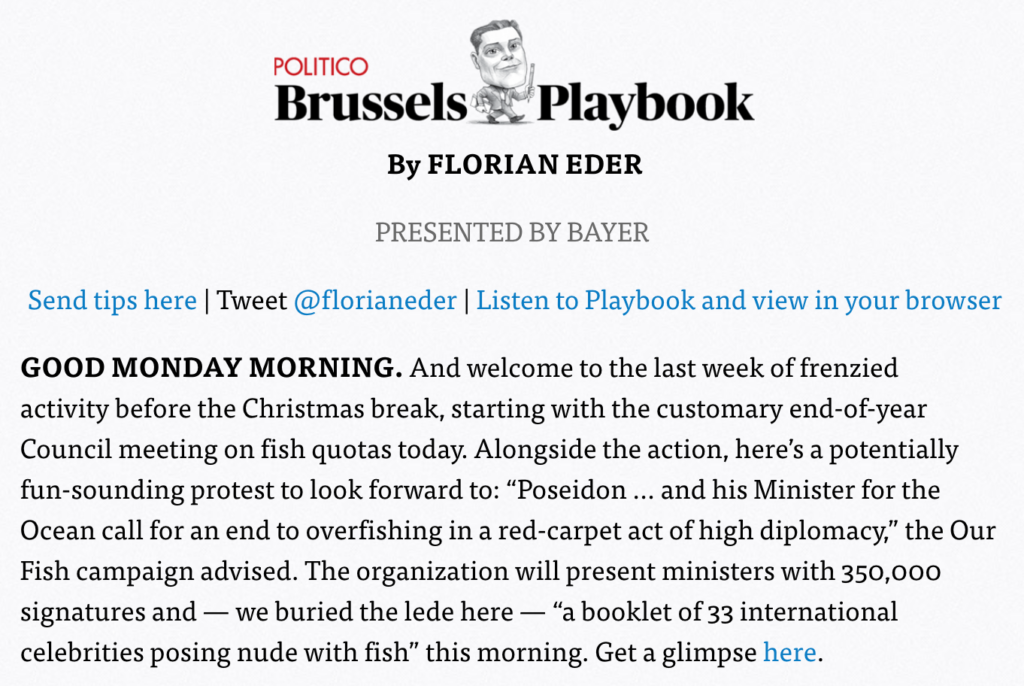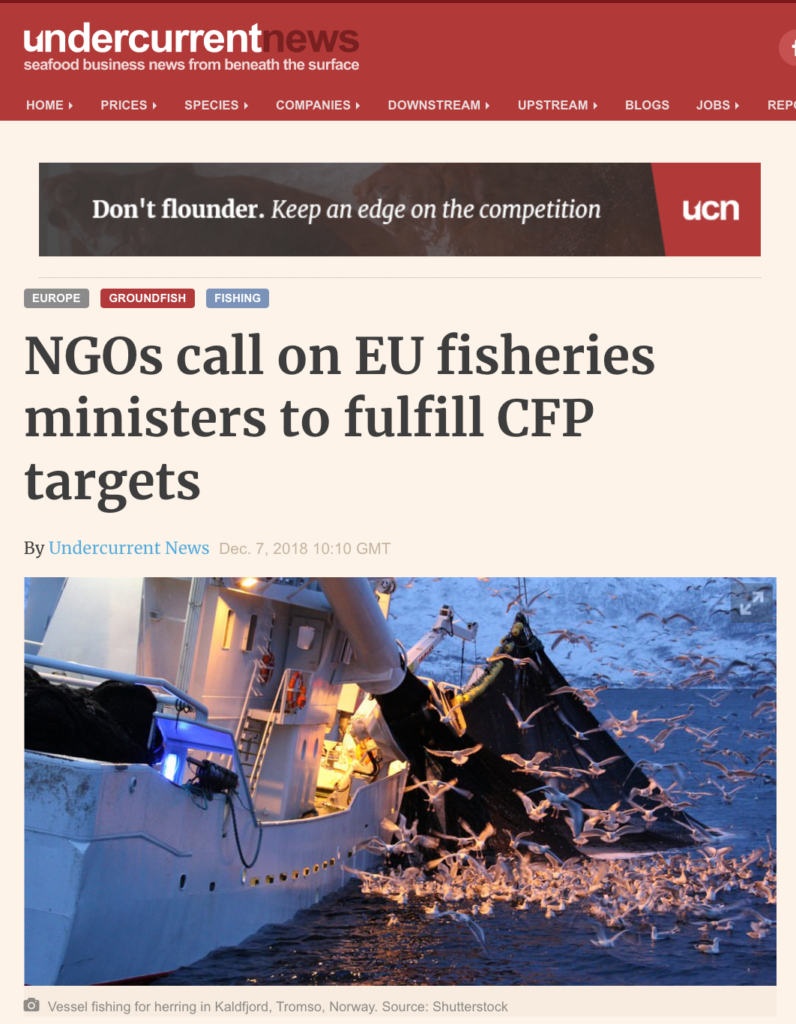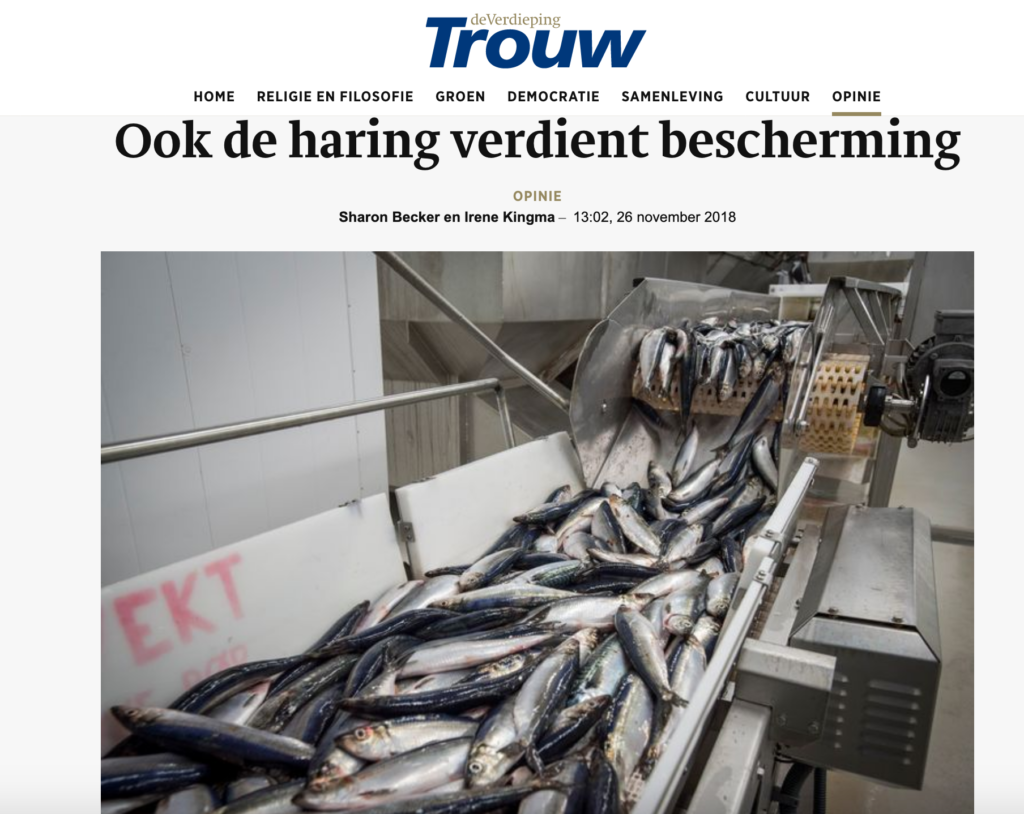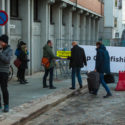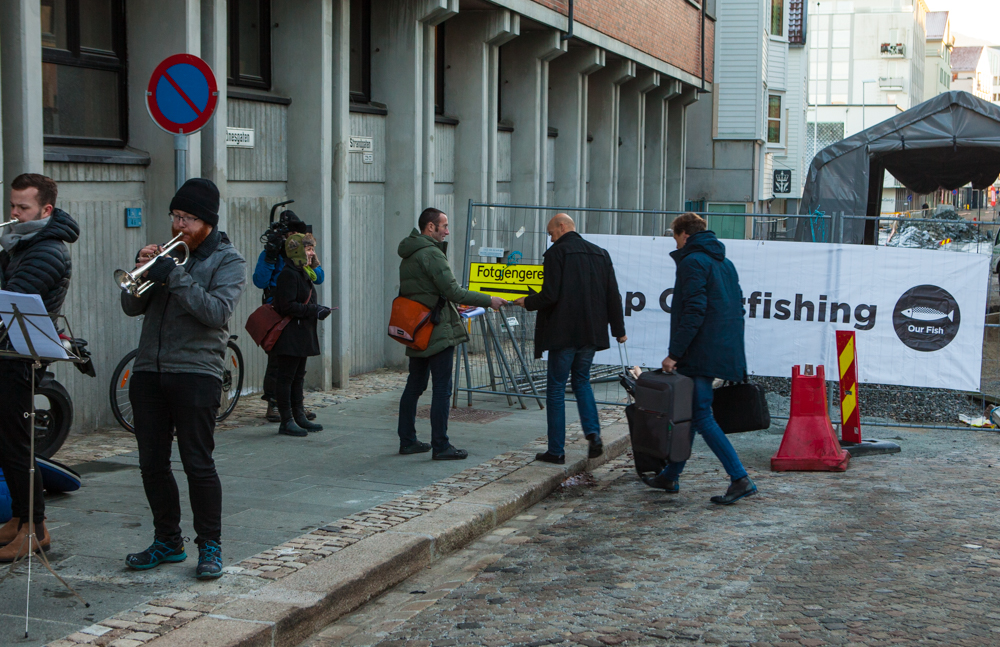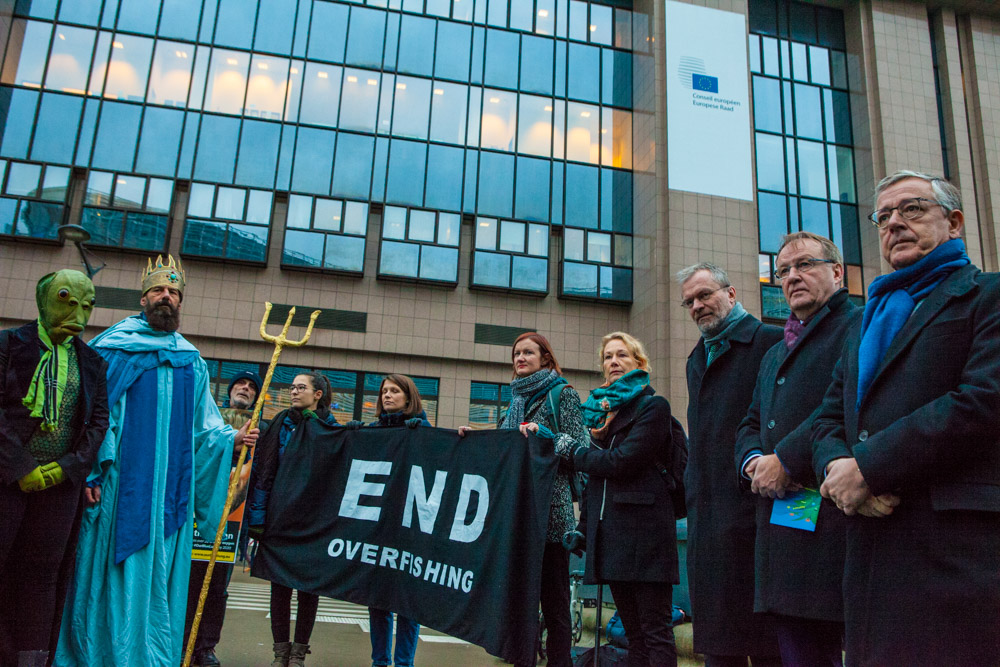
Brussels, December 17, 2018:- Poseidon, the well-known god of the sea, and his Minister for the Ocean, slammed EU fisheries ministers for refusing them access to the Agriculture and Fisheries Council meeting opening today in Brussels.
Poseidon had earlier been introduced to Director General of DG Mare, Mr Aguiar Machado, Austrian Ambassador Thomas Oberreiter and German government fisheries representative Walter Duebner during a formal red carpet ceremony outside the Agrifish meeting venue, the Justus Lipsius building, where 12-year old Tahina Mongodin presented the officials with gifts and the signatures of over 350,000 EU citizens, with the words “this is for our future”.
“The ignominy!”, fumed Poseidon, after arriving with this minister and retinue by rickshaw as Brussels rush-hour traffic roared by the majestic Schuman roundabout. “I have travelled far, from the depths of the Atlantic Ocean, across the North Sea to the shores of Belgium to deliver a stern message on behalf of the oceans and EU citizens – Commissioner, ministers, end your overfishing, now! Yet for all their platitudes, they have refused, me, Poseidon, access to meeting where they discuss my marine kingdom, which provides bounty to EU citizens. Ministers, you made a law five years ago to end overfishing – but we worry that you will continue to ignore the word of scientists, and continue plundering my seas in pursuit of profit.”
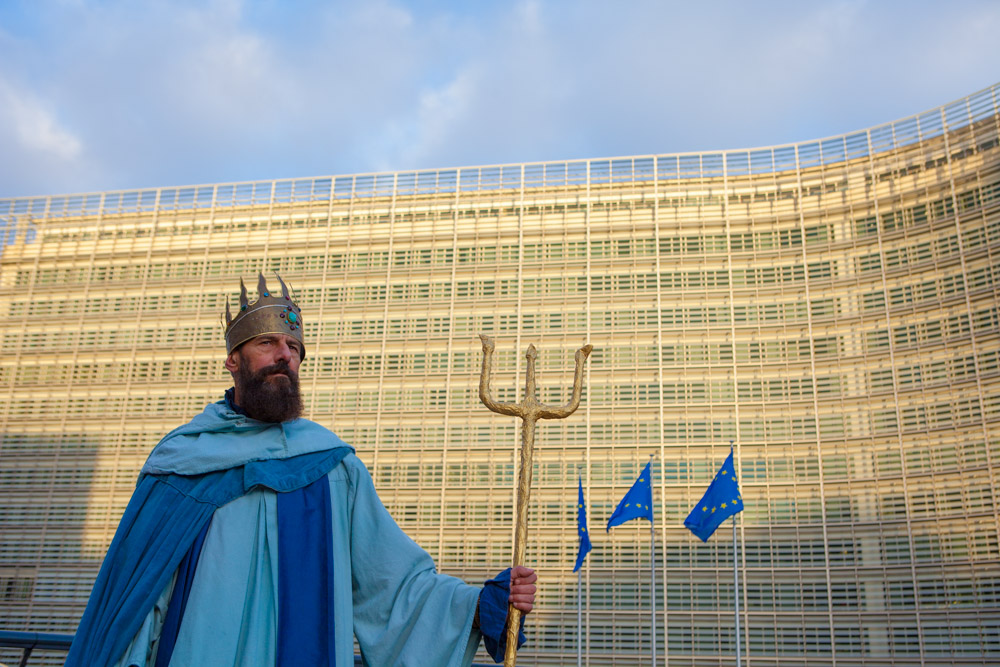
“With just one year left until the 2020 deadline to end overfishing, fisheries ministers must pay attention today to the message from than 350,000 EU citizens and over 30 European and international celebrities: break the annual cycle of setting quotas above scientific advice, and deliver the healthy fish stocks you committed to”, said Rebecca Hubbard, Program Director for Our Fish.
“This year’s meeting is critical, both because it is our last chance before the 2020 deadline to end overfishing, and because the EU ban on wasting unwanted fish (the Landing Obligation), must finally be fully implemented. But concerns about ongoing discarding of overfished and vulnerable species mean that ministers must also address the need for radically increasing monitoring and control, if we are to ensure the limits and rules that are set, are respected and complied with.”
“Ending overfishing is the most practical and achievable thing EU ministers can do to help our oceans under pressure – it will ensure healthier fish stocks, which is the basis of secure incomes, thriving coastal communities, and a flourishing marine environment. There is no good reason to continue delaying action – in fact, in many cases, it is the political delays of the past that have put fish stocks in the difficult situation they are in today. Our oceans, and our current and future generations, deserve better leadership,” concluded Hubbard.
Three petitions collected since October 2017, have collected over 350,000 signatures from EU citizens in support of an end to EU overfishing [1]. Last week, Our Fish asked supporters to write to Commissioner Karmenu Vella and EU fisheries ministers, asking them to end overfishing during the December Council meeting. Over 7,000 emails have already been sent to Commissioner Vella, and fisheries ministers in Denmark, Germany, Netherlands and Portugal.
The reform of the EU Common Fisheries Policy in 2013 included a commitment to end overfishing by 2015, or by 2020 at the latest, however the latest assessment shows that over 55% of North Sea and Atlantic fish stocks are still overfished – experts have said that at this rate, the EU will not meet the 2020 deadline [2]. The introduction of the ban on discarding fish at sea, or throwing unwanted fish back (called the landing obligation), is also being rejected by industry interests, who for the most part have refused to change their discarding behaviour [3].
In December 2017, when the AGRIFISH Council of ministers set limits for 2018 fishing activities in the North Sea and Atlantic – 57 TACs were set 9% above scientific advice on average (where comparable scientific advice was available) – amounting to over 206,000 tonnes of excess TAC. This was a continuation, and even a small increase, on the year before, where 2017 TACs were set 8% above scientific advice on average [4]. Ireland, UK, Belgium, Netherlands and Denmark top the overfishing league table – having received the highest amounts of TAC above scientific advice for 2018[4].
Photo and Video
. For any specific queries or requests, email dave@our.fish
Joint NGO Recommendations
Ahead of the EU Fisheries Council Meeting, NGOs recently wrote to EU Fisheries Ministers with recommendations for total allowable catches for selected Northeast Atlantic and North Sea stocks:
- NGO Letter to Fisheries Ministers of the EU Member States ahead of EU Fisheries Council Meeting, 17-18 December 2018 (pdf)
- Joint NGO recommendations for 2019 total allowable catches For selected Northeast Atlantic and North Sea stocks, December 2018 Annex I (pdf)
- Joint NGO recommendations for 2019 total allowable catches For selected Northeast Atlantic and North Sea stocks, December 2018 Annex II (pdf)
Staying Up All Night to Get Quota
Last week, the Our Fish campaign released a satirical animation lampooning the annual EU ritual of all-night deal-making and continued overfishing.The provocative video highlights the opaque deals on annual fishing limits and agreements made by EU fisheries ministers to fish beyond scientific advice – in other words, overfishing – during the Agriculture and Fisheries Council meeting.
ENDS
Notes:
Staying Up All Night To Get Fish (Quota) is also available in German, Dutch and Danish:
- Die ganze Nacht aufbleiben, um Fisch zu bekommen (Quote)
- De Hele Nacht Opblijven Voor Vis(quota)
- Festen om fiskekvoterne
[1] Three petitions collected since October 2017, have collected over 350,000 signatures from EU citizens:
https://act.wemove.eu/campaigns/save-eu-seas
[2] Scientific, Technical and Economic Committee for Fisheries (STECF) – Monitoring the performance of the Common Fisheries Policy (STECF-Adhoc-18-01). Publications Office of the European Union, Luxembourg, 2018.
[3] Scientific, Technical and Economic Committee for Fisheries (STECF) – 57th Plenary Meeting Report (PLEN-18-01); Publications Office of the European Union, Luxembourg, 2018.
[4]. New Economics Foundation 2018, Landing The Blame: Overfishing In The Atlantic 2018. https://neweconomics.org/2018/03/landing-blame-overfishing-atlantic-2018
Contacts
Dave Walsh, Our Fish Communications Advisor, dave@our.fish +34 691826764
Rebecca Hubbard, Our Fish Program Director, rebecca@our.fish +34 657669425
About Our Fish
Our Fish works to ensure European member states implement the Common Fisheries Policy and achieve sustainable fish stocks in European waters.
Our Fish works with organisations and individuals across Europe to deliver a powerful and unwavering message: overfishing must be stopped, and solutions put in place that ensure Europe’s waters are fished sustainably. Our Fish demands that the Common Fisheries Policy be properly enforced, and Europe’s fisheries effectively governed.
Our Fish calls on all EU Member States to set annual fishing limits at sustainable limits based on scientific advice, and to ensure that their fishing fleets prove that they are fishing sustainably, through monitoring and full documentation of their catch.
Website: http://our.fish
Follow Our Fish on Twitter: @our_fish


